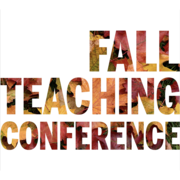
In the midst of a pandemic, many global challenges, and the prospect of a fully remote fall semester, the Bok Center spent the summer grappling with a multitude of questions: How should we prepare graduate student TFs to teach remotely? How could we reimagine our flagship event, the Fall Teaching Conference, usually a bustling two-day conference held in Sever Hall the week before classes start? How could we meet the needs of both new and experienced TFs facing an unprecedented semester?
Like instructors everywhere, we couldn’t take anything for granted. We had to think intentionally about even the smallest decision. The pandemic forced us to get in touch with our core values, articulate our goals clearly, and reimagine the Fall Teaching Conference to reflect our objectives and meet TFs’ needs. All of our brainstorming, planning, and teamwork resulted in a robust 3-week program, with our new Hit the Ground Running (HTGR) Canvas site at its core. We designed the site around foundational self-study modules, which take TFs through topics including where to begin, TF roles and responsibilities, building and sustaining community online, and lesson planning and inclusive teaching.
![]()
Using what we learned from our remote summer Bok Seminars, we planned a 3-session synchronous training for TFs who wanted to engage beyond the HTGR Canvas site. Nearly 300 TFs from across GSAS took the opportunity to delve deeper into the Canvas modules, share and explore more ideas for teaching remotely, and connect with a cohort of their peers. Our team led a total of fourteen 3-session cohorts, each with a group of 15-30 graduate students. The feedback from TFs was overwhelmingly positive:
- I learned incredibly concrete and helpful strategies for online teaching and I feel much better equipped to teach and help my teaching team this semester! Thank you for providing so many useful resources and demos.
- I thought this three-day program was fantastic and, honestly, even more effective -- perhaps because it felt more intimate and focused? -- than the in-person fall teaching conference in 2019.
Almost 50 TFs then opted to put into practice what they had seen modeled in the synchronous training by joining a practice teaching session. In these sessions, TFs presented a short lesson to a small group of peers, facilitated by our Pedagogy Fellows, who, according to one participant, “were immensely helpful! They were a great source of information and experience.” Equally valuable was the opportunity to observe their peers and contribute to a collaborative discussion about teaching: “I really appreciated being able to see other TFs practice teaching and model different styles/examples/etc. I also felt like this was a very comfortable and welcoming environment, where we could ask questions and all contribute.” We integrated practice teaching into the Fall Teaching Conference for the first time this year and are excited to make it a mainstay in future conferences, to be a space for TFs to practice, connect, and reflect.
Finally, we planned a robust slate of nine plenary sessions focused on key topics TFs could explore in more depth. The plenaries allowed TFs to engage in discussions on topics including equitable and inclusive teaching, teaching remotely with images and objects, and academic integrity in remote education, and also provided a forum for many of our campus partners to engage with TFs. The top highlight among many from the plenaries was the session delivered by Erika Bailey, Head of Voice and Speech at the American Repertory Theater and Lecturer on Theater, Dance & Media, on Teaching with Presence...even through Zoom! Erika drew an audience of 163 TFs who all walked away from their screens with concrete tips and strategies for how to increase their energy and engagement with students.

In summary, our 2020 Fall Teaching Conference brought together nearly 400 participants, with our team of staff from the Bok Center and partner offices, for three weeks of synchronous sessions focused on teaching and building community remotely. The preparation and execution of this program exemplifies the multi-generational teamwork at the core of the Bok Center’s identity. Our work this year will have a lasting impact in the durable resources we created, the growing community we have engaged across the FAS, and the design and delivery of future programming.
We invite our graduate student community to continue the conversations we started at the conference into the academic year, whether by engaging with videos and other conference resources and additional modules now posted on the Hit the Ground Running Canvas site or coming to our TF resource hours with their remote teaching questions and ideas. Now is also a great time to think about having your class observed or recorded or to consult with us about student feedback or other teaching topics. PhD students are always welcome to join our Bok Seminars, pursue one of our Teaching Certificates, or apply to one of our fellows programs.
